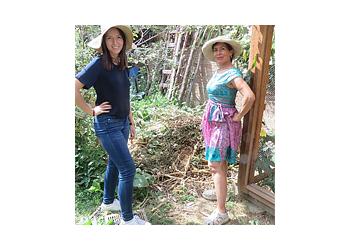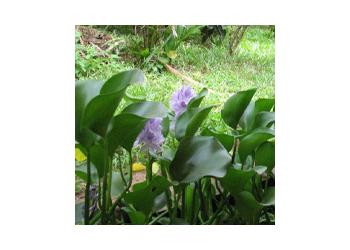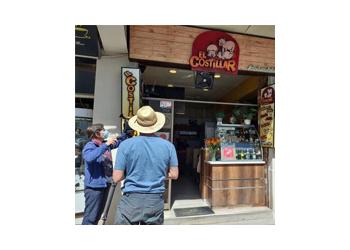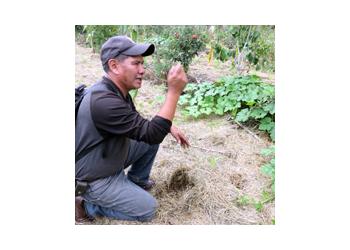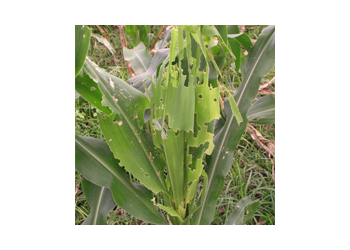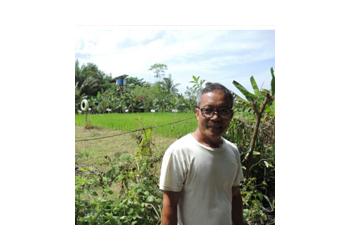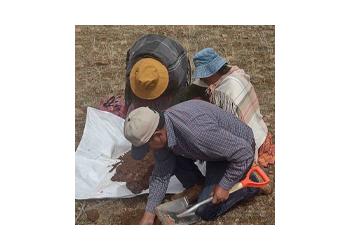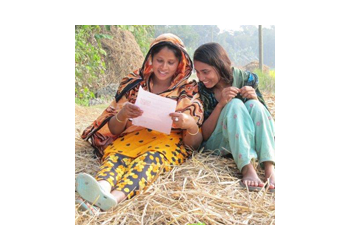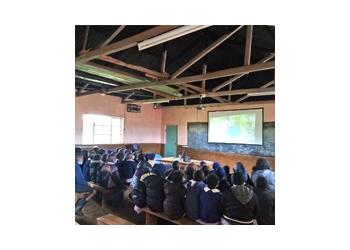Blogs
Trash to treasure
Food waste could be made into useful compost, instead of mixing it with plastic and other inorganic trash, as my wife Ana recently explained on a panel discussion on Radio Cepra in Cochabamba. She was invited by a local NGO, Alerta Verde (Green Alert), along with two agronomists who encourage schools and families to make compost, and a student who is writing his thesis on urban families who compost.
The first two panelists responded to the concerns of city dwellers: how to make compost while avoiding flies, rodents and bad smells. Old ideas from gardening manuals were recycled,…
The problem with water hyacinth
In the twentieth century, gardeners innocently spread the water hyacinth to Asia, Africa and elsewhere. Water hyacinth has striking blue flowers and was used to adorn ornamental fountains. But it escaped and was soon clogging lakes, ponds and municipal water supplies.
Water hyacinth is such a survivor that you can drain ponds, let the plants dry out and burn them – then watch them grow again when the pond is refilled. It’s not surprising that control options are limited, particularly in open water, such as lakes and rivers.
The plants can be hand removed, by people willing…
From family farm to family firm
In Peru, one way to save endangered, native potatoes is by selling and eating them. I recently learned that some restaurant owners are buying native potatoes directly from farmers.
Paul and Marcella and I went with local agronomist Raúl Ccanto to meet Guido Villegas, the Huancayo city official in charge of promoting food security and local commerce. He told us that the government of Peru has a program to feed children (Qali Wamru: “vigorous child”) where the national government sends foodstuffs that can be easily stored and transported.
The city of Huancayo supplements…
A revolution for our soil
Degraded soil can be repaired, and replenished with nutrients, until it produces abundant harvests at lower costs, while removing carbon from the atmosphere, and putting it back into the ground. This is the optimistic message of David Montgomery’s book, Growing a Revolution.
In many parts of the world, soils have been degraded by frequent plowing. The benefits of releasing a burst of nutrients for the crops and killing weeds are overcome by exposure of the soil to erosion by wind and water.
In the Midwestern USA perhaps half of the original prairie soil, and most of its…
Battling the fall armyworm
In the 1500s, when men on sailing ships were casually spreading crop plants from one continent to the next, maize came to Africa. Fortunately, many of the maize pests stayed behind, in the Americas. But slowly, trade and travel are re-uniting maize with its pests. A caterpillar called the fall armyworm is the latest American pest to reach Africa, and it has spread across the continent, threatening one of Africa’s staple food crops.
Just as maize originally came to Africa without its American pests, the fall armyworm arrived without its natural enemies, including a couple of dozen…
Seeing the life in the soil
Soils that have many living organisms hold more carbon and nutrients and can better absorb and retain rainwater, all of which are crucial in these times of a disturbed climate.
But measuring life in soils can be a time-consuming activity depending on what one wants to measure. While bacteria and fungi cannot be seen by the naked eye, ants, grubs and earthworms can.
In one of the training videos that we filmed in Bolivia, Eliseo Mamani from the PROINPA Foundation, a science and technology organisation, shows us meticulously how you can measure the visible soil organisms with…
Soil science, different but right
Soil may be the basis of farming, and therefore of almost all of our food, but farmers and soil scientists see the soil in completely different, if equally valid ways.
In Bolivia, I was recently making a video with Paul and Marcella on soil tests that extension agents can do with farmers. Our local expert was Eliseo Mamani, a gifted Bolivian agronomist.
Before our visit, Eliseo had prepared three soil tests in collaboration with soil scientist Steve Vanek. One of the tests uses bottles and sieves and cloth to separate out the “particulate organic matter”, or POM … dark…
Micro-chefs
In this era when many societies have embraced fast food and convenient, ready-made meals, it was refreshing to watch a documentary on the Korean Air flight back home recently, showing how citizens, chefs and scientists across the globe are increasingly waking up to the importance of nurturing and promoting local food cultures.
Dustin Wessa, the presenter in the documentary, “The Chef of Time,” is an American chef who has been living in Korea for 15 years, specialising in fermented food and beverages, such as Makgeolli, a milky and lightly sparkling rice wine.
In his opening…
The curse of knowledge
Here is some excellent advice on how to write clearly, especially for smallholder farmers.
Steven Pinker writes charming books on language and on the mind, where he manages to explain complex ideas clearly. He is so well read that he branched out and wrote an optimistic book on violence, explaining that regardless of what most people think, the world is getting more peaceful, and Pinker has the numbers to show it.
In most of Pinker’s books at one time or another he ridicules what he calls the “purists” who correct other people’s English. The purists are often armed with…
Videos help bring agriculture to schools in Kenya
The Entrepreneurs for Rural Access (known as ERAs) of Access Agriculture (www.accessagriculture.org) have been working with youth in schools and farming communities surrounding the schools as part of a joint project with the Knowledge Centre for Organic Agriculture in Africa (KCOA), a programme funded by BMZ and implemented by GIZ.
The activities focus on screening farmer training videos to scale up the adoption of agroecological farming practices, such as making compost, establishment of vegetable gardens and using environment-…

